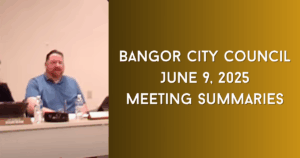
Well, I called it. I predicted back in December that the city of Bangor would settle on some arbitrary number for grants and let nonprofits apply for money without any kind of overarching plan in place. ARPA funding in Bangor went from Zero to Brewster’s Millions real quick, minus the bonus for spending it all on time.
I spoke to City Council on Monday night. I used my 3 minutes to point out that the 2019 Bangor Housing Workgroup Report was still sitting there, after 4 years, waiting to be implemented. I shared with them an excerpt about urgency from the report.
An unavoidable conclusion of the Housing Work Group is that because of the many challenges presented by the current state of housing in the city, Bangor should feel a sense of urgency to follow through on a plan of action and provide a vision for the future of housing, particularly for rental units and vacant properties. In doing so, the Housing Work Group cautioned the city to understand that the circumstances of today are cumulative. The Housing Work Group recommends assertive and decisive action, tempered by reasonable expectations as results will bear out over the long-term.
2019 Bangor Housing Workgroup Report, Page 15
There has been no urgency. No assertive and decisive action. There’s been… nothing. The top recommendation from that report 4 years ago was the creation of a rental registry. We’re still waiting.
When the YMCA expansion came up recently, Bangor City Council cited the 2022 Bangor Economic Development Stategic Report as justification for using ARPA funds for it. On page 28 it calls for supporting the YMCA expansion as a mid-term recommendation. You know what else is on that page? The very next paragraph it says the next steps in the short-term are to implement previous housing plans, including the Housing report. That was glossed right over. It’s almost as if the city isn’t truly interested in solving the housing crisis and is stalling and hoping that the problem will go away all on its own.
Okay campers! Rise and Shine…
Yeah, it’s Groundhog Day again here in Bangor. Every year, every Bangor annual report reads the same as the last. No plans. No changes. Just the bare minimum to satisfy the requirements of the City Charter. Look at how the city speaks about homelessness here in Bangor:
Fiscal Year 2022
Many persons experiencing homelessness are difficult to shelter due to mental illness, substance use disorder, and physical health complications.
Fiscal Year 2021
Many persons experiencing homelessness are difficult to shelter due to mental illness, substance use disorder, and physical health complications.
Fiscal Year 2020
Many persons experiencing homelessness are difficult to shelter due to mental illness, substance use disorder, and physical health complications.
Fiscal Year 2019
Many of the folks that are homeless are difficult to shelter due to severe mental illness, substance use disorder, and physical health complications.
Sounds like a broken record. Each year it feels like last year’s report gets loaded up on a city computer, a few spreadsheets get changed, someone at City Hall clicks “Save As…” and gives it a new name. Same words, different year. And the words themselves perpetuate stigma that those that do not have housing are sub-human. “Persons… are difficult to shelter” like we’re trying to find a kennel that will take our unruly dog. With an attitude like that, no wonder this problem has languished for decades. No real plan to solve homelessness, either. Just Groundhog Day again, and again, and again…
…and don’t forget your booties ’cause it’s cold out there!
It gets even more ridiculous. Here’s some more repeats from the city’s annual reports. Look at how it’s just a copy/paste job year, after year, after year… with only slight changes, if any. Ignoring the repetitive “phoning it in” nature of these reports, there’s also some patterns that I believe were ignored. Take a look at the last 13 years of Bangor’s reporting. Then meet me below for some analysis.
FY 2009
In response to the continued uncertainty surrounding the national economy, management has been closely tracking not only revenues and expenditures, but also foreclosure, liens, unemployment rates, construction starts and related building permit levels, and the State of Maine’s budgetary projections. To date, the City has seen only slight increases in foreclosure and lien rates and will continue to monitor these levels and take steps to assist our tax/rate payers in obtaining assistance wherever possible. Both residential and commercial construction and permitting has slowed.
FY 2010
In response to the continued uncertainty surrounding the national economy, management has been closely tracking not only revenues and expenditures, but also foreclosure, liens, unemployment rates, construction starts and related building permit levels, and the State of Maine’s budgetary projections. To date, the City has seen only slight increases in foreclosure and lien rates and will continue to monitor these levels and take steps to assist our tax/rate payers in obtaining assistance wherever possible. Both residential and commercial construction and permitting has slowed.
FY 2011
In response to the continued uncertainty surrounding the national economy, management has been closely tracking not only revenues and expenditures, but also foreclosure, liens, unemployment rates, construction starts and related building permit levels, and the State of Maine’s budgetary projections. To date, the City has seen only slight increases in foreclosure and lien rates and will continue to monitor these levels and take steps to assist our tax/rate payers in obtaining assistance wherever possible. Both residential and commercial construction and permitting has slowed.
FY 2012
In response to the continued uncertainty surrounding the national economy, management has been closely tracking not only revenues and expenditures, but also foreclosure, liens, unemployment rates, construction starts and related building permit levels, and the State of Maine’s budgetary projections. The City continues to see only slight increases in foreclosure and lien rates and will continue to monitor these levels and take steps to assist our tax/rate payers in obtaining assistance wherever possible. Both residential and commercial construction and permitting has begun to increase slightly.
FY 2013
In response to the continued uncertainty surrounding the national economy, management has been closely tracking not only revenues and expenditures, but also foreclosure, liens, unemployment rates, construction starts and related building permit levels, and the State of Maine’s budgetary projections. The City continues to see only slight increases in foreclosure and lien rates and will continue to monitor these levels and take steps to assist our tax/rate payers in obtaining assistance wherever possible. Both residential and commercial construction and permitting has begun to increase slightly.
FY 2014
In response to the continued uncertainty surrounding the national economy, management has been closely tracking not only revenues and expenditures, but also foreclosure, liens, unemployment rates, construction starts and related building permit levels, and the State of Maine’s budgetary projections. The City continues to see only slight increases in foreclosure and lien rates and will continue to monitor these levels and take steps to assist our tax/rate payers in obtaining assistance wherever possible. Both residential and commercial construction and permitting has begun to increase slightly.
FY 2015
In response to the continued uncertainty surrounding the national economy, management has been closely tracking not only revenues and expenditures, but also foreclosure, liens, unemployment rates, construction starts and related building permit levels, and the State of Maine’s budgetary projections. The City continues to see only slight increases in foreclosure and lien rates and will continue to monitor these levels and take steps to assist our tax/rate payers in obtaining assistance wherever possible. Both residential and commercial construction and permitting has begun to increase slightly.
FY 2016
The City continues to see only slight increases in foreclosure and lien rates and will continue to monitor these levels and take steps to assist our tax/rate payers in obtaining assistance wherever possible. Both residential and commercial construction and permitting remains generally flat.
FY 2017
Both residential and commercial construction and permitting remain generally flat. We continue to monitor key revenue areas such as: raising interest rates, automobile excise taxes, and property tax collection rates.
FY 2018
Both residential and commercial construction and permitting remain generally flat. We continue to monitor key revenue areas such as: raising interest rates, automobile excise taxes, and property tax collection rates.
FY2019
Both residential and commercial construction and permitting remain generally flat. We continue to monitor key revenue areas such as: raising interest rates, automobile excise taxes, and property tax collection rates.
FY 2020
Both residential and commercial construction and permitting remain generally flat. We continue to monitor key revenue areas such as: raising interest rates, automobile excise taxes, and property tax collection rates.
FY 2021
Both residential and commercial construction and permitting remain generally flat. We continue to monitor key revenue areas such as: automobile excise taxes, and property tax collection rates.
FY 2022
Both residential and commercial construction and permitting remain generally flat. We continue to monitor key revenue areas such as: automobile excise taxes, and property tax collection rates.
City Government cannot be political.
In FY 2009’s report it bemoans the state of the economy. It continues to do so until FY 2016. Even though the economy had improved significantly during that timeframe, that same tired line “In response to the continued uncertainty surrounding the national economy” keeps getting used. But then in FY 2016 it stops. Why? Remember, these reports are written the following year. Fiscal Year 2016 ended on June 30, 2016. The report doesn’t get written and published until sometime in 2017. What happened in November 2016? Republican Donald Trump was elected President of the United States. Throughout the entire Obama administration there was “uncertainty surrounding the national economy.” But Trump was elected, suddenly we’re peachy keen. Even during the height of COVID, when there was plenty of uncertainty about the national economy, that line never came back.
I point this out because our municipal government is supposed to be free of politics. City government is not a place for that. It is a place for problem solving. It should not matter if you’re Republican, Democrat, Green Party, Tea Party, Rave Party, or whatever else you got going on… local officials should work to solve our problems based on what is the best course of action. Republicans tend to want nonprofits and the free-market to solve the complex issue of housing insecurity. That mirrors the actions (or lack there of) the city has taken to truly solve this crisis. Without a doubt, businesses and nonprofits have a large role to play in the solution. Most importantly it is going to take the city’s leadership and coordination to get this done. That requires everyone to put aside their political ideologies or this current atmosphere of heel dragging will continue.
Working together to solve a problem
In 1946 and 1947 the city of Bangor had purchased several properties in anticipation of the construction of a new auditorium. The properties were slated to be demolished for that purpose. Recognizing they had a housing problem, the city held on to those properties and continued to rent those homes out to residents. In 1952 the city of Bangor was designated a critical defense housing area, largely due to the presence of Dow Airforce Base. During this time parts of Bangor were rent controlled, due to the defense housing designation. When the rent control was due to expire, rather than celebrate the end and let it lapse, the city went to the Penobscot County Rental Advisory Board (we had one of those too at the time) and asked for rent control to be extended. It was approved. That same year City Council members visited housing developments in other states to get ideas for new constructions that could take place in Bangor. Actions were being taken.
Back to modern times: Foreclosures
There was a trend there.
2009 – slight increases in foreclosure and lien rates
2010 – slight increases in foreclosure and lien rates
2011 – slight increases in foreclosure and lien rates
2012 – slight increases in foreclosure and lien rates
2013 – slight increases in foreclosure and lien rates
2014 – slight increases in foreclosure and lien rates
2015 – slight increases in foreclosure and lien rates
2016 – slight increases in foreclosure and lien rates
2017 – No longer being monitored
Each year there’s an increase in foreclosures. For 8 years. Then suddenly we’re not monitoring and reporting on it at all. Today we’re swimming in abandoned bank-owned properties in Bangor. We should have seen this coming. After all, we were monitoring for it.
Construction
2009 – Slowed
2010 – Slowed
2011 – Slowed
2012 – increase slightly
2013 – increase slightly
2014 – increase slightly
2015 – increase slightly
2016 – Flat
2017 – Flat
2018 – Flat
2019 – Flat
2020 – Flat
2021 – Flat
2022 – Flat
Combing these two trends, that tells you that the overall economic landscape of the city is changing. Demand for housing in Bangor is high, but not enough developers want to invest here. Especially when the demand and need is highest for affordable housing. There’s not enough profit in affordable housing to entice new development, which is why governments typically have to subsidize it. The city’s 5-year CDBG plan points that out on 3 occasions. $20.48 million falls out of the sky and suddenly the city forgot what it wrote.
Introducing: Bangor City Council’s Plan to Fix Housing

That’s right. Bangor City Council’s plan is to wait for nonprofits to fix everything. The Council has real problem-solving money in their hands. But they’re going to spend a large chunk of it on image enhancing amenities like a brand-new YMCA building, a new sports scoreboard for the school district, electric charging stations, just to name a few. The rest of the money they’ve compartmentalized with “feel good” numbers. $4.1 million for housing, for example. And how are they going to spend that? They’re going to host a beauty pageant for nonprofits to compete for nickels and dimes. And when the money is all spent and City Councilors have ticked off their wish lists, the housing situation in Bangor will remain virtually unchanged.
“Don’t blame us,” the Council will say, “we funded nonprofits, and their missions should have solved the problem.” What an absolute farce.
Zero Accountability = Zero Results
Let’s face it. Why should City Councilors bother? (Besides the whole running for Bangor City Council “to make Bangor a better place” thing.) Bangor keeps re-electing the same people over and over again and expects different results. Foreclosures keep increasing? Re-elected. Construction slows? Re-elected. Transit system reducing service schedule and not able to fully serve the city? Re-elected. Encampments increase in size because we can’t provide accommodating shelter or housing? Re-elected. Creating a humanitarian crisis that sees people at risk of freezing to death in the Maine winter? Re-elected. Sit on our hands with ARPA funds in the face of a growing crisis with substance use disorders? Re-elected. Downtown falling apart? Re-elected. And those same people that keep getting re-elected are in charge of selecting a City Manager, who reports to City Council.
Foreclosure trends unaddressed. Housing shortages unaddressed. Downtown conditions unaddressed. Financial audit issues unaddressed. Federal funding noncompliance issues unaddressed. The City Council demands answers or accountability for none of it because they themselves have no accountability.
Even on ethical issues. Short of breaking a state or federal law, who is able to hold City Council accountable? Not the Ethics Board. The Ethics Board can only look into matters that the City Council refers to them. If City Council doesn’t tell on itself, nothing happens. What a sweetheart deal that must be. We saw this happen recently on January 30, 2023 with the YMCA ARPA funding discussion.
“It feels icky”
City Council Chairman Rick Fournier disclosed a conflict of interest at that January 30th City Council Workshop where funding for the YMCA was discussed. He is on the Capital Campaign for the YMCA. Maine law requires he abstains from discussion and voting on the issue. His disclosure triggered a motion from another councilor that he indeed had a conflict, it was seconded, and passed unanimously. But that wasn’t all. Before this disclosure, the executive director of the Bangor YMCA, Diane Dickerson, contacted Mr. Fournier to complain that 3 City Councilors were not returning her communications. Diane Dickerson asked Mr. Fournier to “get movement” on those three. By his own admission, he facilitated those meetings. Who were those 3? What was said? No idea. It was never disclosed.
This disclosure didn’t appear as a shock to anyone seated at that table. None of them needed a minute to reflect or think about what to say. It was as if this entire matter was discussed privately as a body, without an executive session called. A violation of the Maine Open Meeting law. Their minds were already made up before the cameras were turned on and the disclosure was publicly made. One by one each council member made a statement. Each a variation of: it doesn’t look good, wish you had told us sooner, we would have been talking about the YMCA anyways, mistakes are made, no big deal. Or as Councilor Davitt put it, this “feels icky.” Yeah, yeah it does. There’s an Ethics Board for that. They’re pretty bored these days, I’m sure they’ve got the time to give this a look.
Conflicts of interest are required to be disclosed for a reason. Regardless of what you feel your motives are in your own heart and mind, the public must be protected from any appearance of impropriety. It’s a simple premise, really. If you know you have a conflict of interest, don’t take actions between the parties in that conflict of interest. In any capacity.
In this situation Mr. Fournier used his influence as Bangor City Council Chairman to push 3 other councilors into talking to an organization for which he sits on the capital campaign for. To discuss what? The city giving capital funds. The very thing he’s on the YMCA’s board to raise. What is the point of disclosure at all then if you’re free to make calls and lobby on behalf of your conflicted organization? This is something that should have undergone an ethical review. But it won’t. Council has swept it under the rug. What will come of this? Re-elected.
Can anything be done to stop this train before it wrecks?
Short of the spirits of Housing Past, Present, and Future visiting each of the Councilors and convincing them to change their ways through visions, it’s going to be an uphill battle with poor odds. And political ideology can’t be blamed here. All 9 councilors appear to be on board with loading ARPA money into a cannon and firing it over the city. But their allocations will be so stingy that it’ll be coins making it hail instead of dollars making it rain.
What can possibly be said to make any of them change their minds? Pointing out the lack of a coherent process didn’t do it. Giving examples of how other communities are investing their ARPA dollars into housing for maximum impact didn’t move the needle. The housing report from 2019, which most of them supported, is still sitting on a shelf collecting dust after 4 years. Reminding them of the recommendations within that report felt on deaf ears. Hell, the Council had a report given to them from by their own city staff showing a $5+ million yearly gap in housing investment, and that didn’t even catch their eye.
More of us need to speak up if we have any hope of changing this.
I’m just one voice. It’s going to take a hell of a lot more Bangoreans to show up to City Council meetings and speak out. More of us to write emails. More of us to ask to meet with City Councilors. We need more citizens of Bangor to speak up now, why the money is still in their hands. Waiting until the money’s gone and the housing situation gets even worse will be too late. Climbing out of the hole we’re in now is going to be a chore. Imagine how much harder it will be to get out when we no longer have access to $20 million in rope and gear.
Start with an e-mail. You can write the entire councilors at councilors@bangormaine.gov. You can call them at (207) 992-4205. Send them a fax at (207) 945-4445. Or if you want to reach out to Councilors individually, you can visit their website at this link, and click on the individual members for their email address.
Tell Bangor City Council they need to invest ARPA funds on issues that were most affected by the COVID pandemic, which is what the funds were intended for. And nothing was more exacerbated in this city by COVID than homelessness, substance use disorders, and mental health. Make your voice heard. Email or call Bangor City Council today.







